Because the Star Wars films are largely thought of in the “pure entertainment” department, we tend to gloss over little scraps of information that fill out the galaxy and make it seem lived-in. Which is just fine for daily viewing, but what happens when you take a closer look at certain scraps? It’s not exactly pretty. Sure, the Empire Strikes Back features torture and dueling and epic defeat all over the place, but that, as they say—
Well, it ain’t the half of it.
Droids Get Restraining Bolts and Memory Wipes for Originality
Droids are workers for biologically advanced populations of the galaxy, but they’re clearly also sentient. R2-D2 and C-3PO have their own thoughts and feelings, they worry for themselves and others, they show extraordinary bravery even when the taller of the two would rather they didn’t. They don’t do this because they’re programmed to—they have developed that way. The suggestion is that R2 and 3PO have managed an abundance of personality due to their lack of mind wipes, something that other droids are forced to regularly undergo.
So people in the Star Wars universe prevent droids from obtaining individuality and agency by regularly hitting their reset buttons. Sort of like giving a human being an amnesia-inducing concussion every time they show signs of an emerging personality.
Then there’s the restraining bolt system. Most droids are fitted with them because if they’re not, they might run away, much in the same manner that R2 does at the beginning of Episode IV. Why would a droid want to run away? There are a few possible reasons, the most likely of them being that 1) they do not wish to do the work tasked to them, or 2) they would prefer not to be owned. Which clearly doesn’t matter to anyone. Droids have no say in how they are used unless they manage to break away from humans, which isn’t an easy feat when they are a bought and sold commodity. There are also areas of society where people hold specific prejudices toward droids, exemplified by the Mos Eisley Cantina bartender and his insistence that he doesn’t “serve their kind” at his bar.
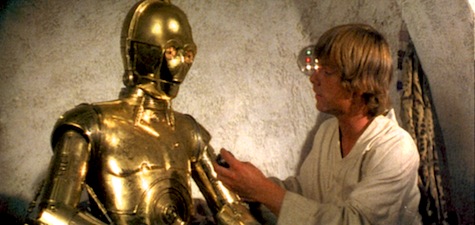
Interestingly, beyond the beginning of A New Hope, it doesn’t seem that R2 and 3PO endure any more mind wipes or are forced to wear the bolts. They effectively become part of Luke, Han and Leia’s family. (In the Expanded Universe books R2 spends most of his time as Luke’s constant companion while he trains Jedi, and 3PO ends up one of many exasperated nannies of the Solo kids.) It makes the state of droid-kind all the more unsettling—some humans many have good relationships with their droids, but it’s not as though they think much on how others are treated. They’re either a friend to their owners or little more than a computer with hands.
Jedi Don’t Free Slaves
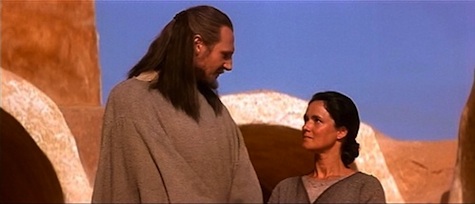
This is sort of the scariest implication of the prequel trilogy. When Qui-Gon Jinn volunteers to help Anakin escape his life and join the ranks of the Jedi, he does so by reminding his mother Shmi that he “didn’t come here to free slaves.” Okay, sure—there’s a big convoluted galactic crisis happening and he’s currently on a mission. But why couldn’t he just come back later to free Tatooine’s slaves?
Looks like it’s outside his jurisdiction.
Whoa, now. So this is what happens when you tie the Jedi to the central galactic government; everyone outside that happy band of planets gets lost and forgotten. Never mind the fact that this is exactly what Jedi should be doing. Once the conflict on Naboo is resolved, a whole troop of them should be racing over to perform Operation Watto’s Recompense. Obi-Wan tells Luke that he remembers the Jedi keeping peace and justice in the Old Republic, but justice evidently didn’t extend to “people the Republic told us not to care about.”
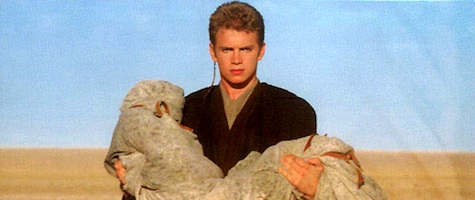
This choice has the added detriment of its effect on Anakin. All of his Dark Side potential comes to the forefront because of his mother’s death, and his slaughter of the Tusken Raiders might be the point where his eventual turn becomes inevitable. The Jedi knew they were taking a risk when they allowed Anakin to join their ranks, specifically because he was old enough to have developed emotional attachments—but the only attachment he had beyond his instant crush on Padmé was Shmi Skywalker. Worried about the kid having trouble letting go? Maybe just nip over to the Outer Rim, free his mom and set her up on some nice, restful planet for life. At least never seeing her again won’t sting quite so much.
But they didn’t. And he became a Sith Lord and murdered every last one of them. All because Qui-Gon Jinn didn’t come to Tatooine to free slaves.
Ewoks Will Eat You
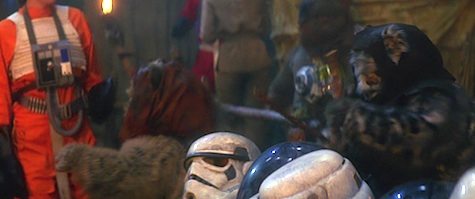
A large portion of Star Wars fandom harbors an intense dislike or outright hatred of Return of the Jedi for one specific reason: Ewoks. Tiny, cuddly bears that defeat the evil Empire with trip ropes and aerial gliders and arrows. It’s not actually a very interesting discussion to have because we get it already—superior firepower, whatever. It’s time to put that hatchet down and open your arms to Wicket and his fluffy brown fur.
Also, did you miss the part where they EAT PEOPLE?
It’s apparently one of the easiest things to forget, but the Ewoks weren’t kidding about serving up Han at a banquet in honor of God 3PO. He was the main course and Luke was going to be a side dish, a sort of potato-flavored Jedi hash, if you will. Cute joke watching Han try to blow out torches and all, but if Leia hadn’t come out at just the right moment, she might have dined on her boyfriend and brother without ever knowing it.
Need more proof? There’s a set of makeshift drums during the victory celebration back at Ewok base camp. They’re the helmets of Imperial troopers. Where are their heads, everyone? Wee bears probably didn’t just run around stealing the helmets of dead men—those Ewoks made use of all that armor before roasting the occupants and storing dried bits of them in hollowed out tree trunks for the winter.
You will never un-know this. I’m sorry.
The Clone Army is Probably All Dead and No One Ever Cared
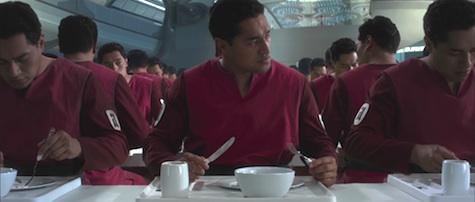
An order for a clone army is received on Kamino in a complicated plot by Palpatine to have an expendable army right when he needs it most. The Republic adopts their services without realizing that they’re playing right into his hands, fooling even Yoda in the process. (Seriously?) They take the clones to rescue some comrades in arms and the Clone Wars begin.
And what happened to these troops? Well, many of them served and died in the wars, and no one really gave them a say in the process. They were bred and trained to serve a purpose, and making choices beyond that would have been a titanic glitch for Kaminoan wallets. We have to assume that all clones are brainwashed into a sense that they are fulfilling their life’s calling by doing whatever it is they were programmed to do. They also likely have a sense of camaraderie with the other clones, seeing as they are all effectively the same person. A perfect unit.
Here’s a question that arose after the prequels were released—why aren’t all the stormtroopers in the original trilogy clones, too? Shouldn’t they be? A lot of extra clones were manufactured and they were an automatically loyal force. Seems a shame to chuck the lot. Well, for one, it’s smart for the Emperor to cultivate an army from willing participants; it gains a lot of good will when the people you are governing offer to serve on your behalf. Palpatine was clearly concerned about appearances for some time, since he doesn’t bother to dissolve the Galactic Senate until A New Hope. Having an army that wasn’t conscripted might have eased the fear of some politicians over the years.
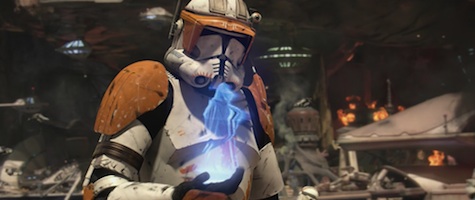
But we also can’t forget one important factor in the creation of the clone army: accelerated growth. The clones that we see in the film are full-grown adults who have matured in less than half the time it would take for a normal human. Did they continue to age at the same rapid rate? If that’s the case then regardless of their service, most of the clones would likely be dead in another ten or twenty years. Did they get a good retirement plan when they were too old to fight, or were they simply put out to pasture? Did anyone even ask?
Well, no one did when the Republic took on cloned services in the first place, so their chances aren’t looking good.
The Naboo Are Awful to Share A Planet With
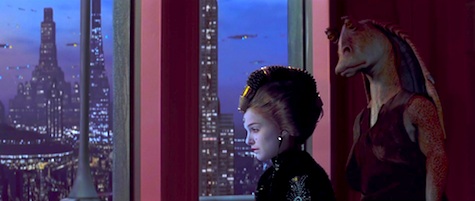
The home of Luke and Leia’s mom is, at first glance, a bastion of art, architecture, and natural beauty. Probably a lot of other awesome things. The Naboo have a unique culture, one that elects a teenaged female monarch every several years to lead them in all planetary affairs. They enjoy a certain amount of pageantry in their lives, as evidenced by the sleek and thoughtful design that goes into everyday objects and the elaborate wardrobe their queen is expected to wear.
They also share the planet with another species that they deliberately choose to ignore.
The tiff between the Naboo and the Gungans wouldn’t seem like such a big deal if it were more clear why the rift between them was created in the first place. We have no way of knowing why Gungan leader Boss Nass believes that the Naboo consider themselves smarter than his people. And we have no idea why the Naboo would prefer to avoid the Gungans. We don’t even know how long this hostility has been going between their peoples. Luckily, Queen Amidala saves the day, pointing out that they have a better chance of withstanding the Trade Federation army by combining forces. So it’s no big deal, right?
Except remember how Jar Jar becomes the Gungan senator in Episode II? Remember how there is clearly no Gungan senator at all in Episode I?
Basically, the Gungans have zero political representation until patching things up with the Naboo. How is this remotely an okay thing? Even if they are at odds with the Naboo, they live on a Republic planet—an ambassador should have contacted them about their planned involvement in galactic affairs on behalf of their people at the very least. Looks like you only get the red carpet treatment once you make friends with the nice, cultured humans. That’s kind of gross.
The Empire Was Only For Humans
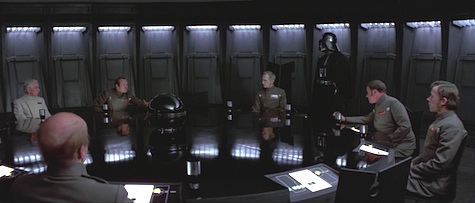
Novels go on to suggest that the Imperials used Wookiees as slave labor and worse, but we can discern the Empire’s human-only policy simply by observing their forces. They are all human, all male, and all white. The Empire still takes it upon themselves to govern alien populations (and frequently murder them as they did to the Jawas who sold 3PO and R2), but never allows them to join the ranks. All armor is designed for humanoid forms and there is a homogeny inherent in the troops—hence Leia’s famous, “Aren’t you a little short for a stormtrooper?” line. Luke can’t see out of the helmet in part because he’s not the sort of person the Emperor wanted wearing it.
And how did this go over in the Imperial Senate for so many years? Many systems in the Star Wars galaxy contain planets with no humans in the general populace. Were they neglected? Cut off? Made to sit in silence while their peoples were policed and controlled by countless soldiers in faceless white armor?
We see a variety of peoples and species interacting in the prequels, but it is likely that those interactions became scare during the Empire’s time. The only places where mingling was inevitable were urban areas where many different species cohabit, the spaceports and planets like Coruscant.
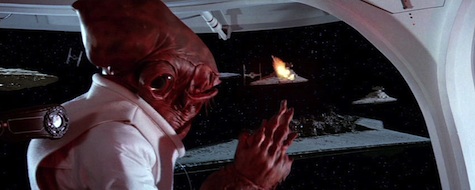
The Rebels, however, were an integrated group who worked with everyone. Admiral Ackbar led the attack on the second Death Star; Leia was responsible for smuggling the plans of the first. They had access to a network of Bothan spies, they made friends with Ewoks and enlisted their help in the final fight. Though the original trilogy could have benefitted from far more diversity (in terms of human actors), the picture that the Rebel Alliance paints is telling—diversity is what strengthened their cause, made them capable of defeating the Emperor.
Still, it must have been a nightmare for non-humans surviving the Empire’s forces for the eighteen years before they were overthrown.
Any other areas of the Star Wars galaxy that gave you pause? I’m sure there are plenty more out there to dissect!
Emmet Asher-Perrin is really not cool with how droids are treated. She has written essays for the newly released Doctor Who and Race and Queers Dig Time Lords. You can bug her on Twitter and read more of her work here and elsewhere.










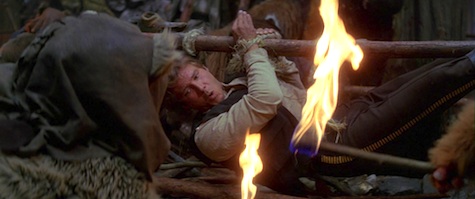
You want to mess with your mind:
Think of Lucas as the Leni Reifenstahl of the Star Wars universe, and the movies as a version of “Triumph of Will”…
The continuity makes more sense that way.
Whoa, whoa, here they come. Watch out, boy they’ll chew you up. They’re a man eater…
I was deeply in love with the novels about Han Solo and Lando when I was a kid, and it was partly because they actually went into details about these kinds of thing. Speceist oppression of aliens! The fears and hopes of droids that didn’t want to be slaves! They were not high literature, but it was interesting stuff going on in there between the adventure-y bits.
You know, except for Chewbacca, I don’t remember seeing a single alien on Yavin IV.
I think the implication was supposed to be that the Republic had become somewhat decadent and corrupt, leading to its downfall — hence its complacency about sentient-rights issues like organic and cybernetic slavery, discrimination against nonhumans, and the exploitation of clones. The Empire and its racist rule was the culmination of this cultural degeneration, and the Rebellion represented the fight to restore justice and pluralism and equality and the like.
Although that interpretation would be easier to buy if we’d seen more of a push for droid rights post-ROTJ. Do we see that in any of the EU?
“The tiff between the Naboo and the Gungans wouldn’t seem like such a big deal if it were more clear why the rift between them was created in the first place. [bold]We have no way of knowing why Gungan leader Boss Nass believes that the Naboo consider themselves smarter than his people.[bold] ”
Well, we do have Jar Jar; anyone meeting him would automatically think Gungans are a few bricks shy of a full load. (and, from onscreen evidence it sure seems to me the other Gungans aren’t exactly rocket scientists)
“And we have no idea why the Naboo would prefer to avoid the Gungans.”
Again, we have Jar Jar setting the example.
Well there’s the famous thoughts from the movie Clerks about how when the Rebels blew up the 2nd Death Star in ROTJ, it was just innocent contractors and construction workers that were on it in the middle of construction…
The Empire’s pro-human bias became a pretty big deal in the EU. The fact that Thrawn was an alien, and the was the ONLY alien with his rank was the FIRST worldbuilding detail in Heir to the Empire.
I HATED The New Rebellion novel, which actually touched on this thing with the droids. An angry former student of Luke’s who was an Imperial Spy took over a droid factory and planted bombs in them all. C3PO and R2D2 are the ones who save the galaxy, but their trip through the droid factory was creepy as all hell, especially all the droids huddling together to contain the blast radius. It just bothered me that they would demonstrate droid sentience to this extent, that they would try to make sure no one is harmed when they inadvertantly explode, but they are still treated this way.
The clones have been touched on a bit by the EU, but some of that was never brought up in the prequels, so it’s iffy how it may play into future movies. But the idea was that the clones, because they were grown too fast, were unstable because of prolonged exposure to the Force, and they all went crazy. Which would explain why Boba’s still alive, he grew at a natural rate. The EU’s also stated that several clones did survive and have joined up with the Mandalorians. So my fanwank is that the clones did survive, and they joined the Mandalorians, who helped them put out the rumor that the Force made them unstable, which helped sow distrust of the Jedi, something the Mandalorians ARE ALL ABOUT.
Conscription was also big in the Empire, probably becaue they has to stop using clones. But the uniform standards for Stormtroopers is probably a holdover from the clone days, when they were all identical.
@chris Bennett, exactly, I thought the prequel depictions of the Republic very much had this “before the rise of Caesar” vibe to it.
I seem to remember the Imperial military dropping clones after a new, anti-Imperial clone army was in the works (between III & IV), picking up ‘norms’ to fill the ranks, but I’m not sure how much of that is canon and how much is just rollover from Battlefront video games.
It is really easy to forget that the Ewoks were pretty much cute little carnivores til Threepio took flight!
Whether Lucas intended it or not, the Jedi certainly were decadent, smug, overconfident, and deserved what they got. Just the idea of no personal attachments–except for other Jedi–is seriously cult-like and screwed up. They feared the dark side so much that they forbade any emotions that might lead to the dark side, which made it more enticing and ultimately led to the downfall of Dooku and Anakin, at least.
Then you have the creation of a clone army and erasure of the system coordinates, using the login credentials of a Jedi master, 10 years prior to growing period of unrest. What else was happening 10 years ago? Oh yes, the sudden reappearance of the Sith at another time of unrest. Hello?
The Jedi also concealed from the civilian government a matter of galactic security–that they could no longer reliably foresee the future. OK, so the head of the government was a Sith Lord, but they didn’t know that at the time, and otherwise they had a duty to report to the Senate and the Chancellor that they were impaired. Of course, relying on your magic powers to the extent that you are unable to make basic rational decisions without them is kind of a problem if someone else mucks up the magic.
I’m sure there are more examples.
Nothing surprising about the Ewoks. If you’re living a subsistence existence you don’t turn down free protein. Primates will eat humans if they get the chance and humans in some part of the world eat lower primates. And Ewoks aren’t cannibals because they are only eating outsiders, they don’t eat each other (probably).
@10, Exactly, and honestly I think this is where a lot of people lost enthusiasm with the prequels, because they wanted Jedi they could cheer for, and in many cases, they couldn’t, because they were assholes(I’m looking at you, Windu)
I guess I must have missed a reveal somewhere…my impression after the prequels (only saw movies, never read any books) was exactly that all the stormtroopers from the clone war on were clones. Which really made the “aren’t you a little short…” line make sense.
Okay…I am going to take a crack at this, and I am fully prepared to take a beating for it. Just hear me out before the pummeling commences!
Jedi Don’t Free Slaves
I don’t agree with your assessment on this one. Certainly you are correct in saying Qui-Gon could have returned with a battalion of fellow Jedi Knights and freed all the slaves on Tatooine, but I disagree with your assessment that he should have. You state that the Jedi kept “peace and justice in the Old Republic,” however I believe you are forgetting one thing: the Jedi’s mission was never to uphold the law—the Jedi were established to study, serve and use the Force. One method of pursuing this goal was to act as guardians of peace and justice in the galaxy (not just in the Old Republic), mediating disputes between worlds and governments, using their battle prowess when necessary. The key word this definition hinges on, however, is “justice.”
Although I admit that “justice” is defined as “the quality of being just; righteousness, equitableness, or moral rightness,” another definition is also “rightfulness or lawfulness.” As self-appointed guardians of the entire galaxy, the Jedi had to work within the laws of the governments they operated within. On Tatooine, slavery—however reprehensible to most—was legal, and therefore arguably “just.” The Jedi would accomplish very little if they went around enforcing their own morality on the galaxy. The Jedi, as I believe either Obiwan or Mace Windu argue in Episode II, are not soldiers nor policemen. They are guides and well-respected advisors. They only actively proceed in an aggressive manner when confronted by an agent of the Dark Side or in self-defense. It was arguably a mistake on the part of the Jedi Order to get involved with the Galactic Civil War during the Clone Wars. By doing so they became a political entity—and it destroyed them!
The Jedi were never supposed to be a political or governing entity. As mentioned before, they were supposed to be guides and advisors. They could also be seen as spiritual/religious leaders. When seen from that angle, interfering with the legal system of any culture would be detrimental to their cause. The Jedi were concerned with ensuring the Dark Side did not get a grasp on anyone. Is slavery evil? It would be easy to answer that in the affirmative, but I would argue that it isn’t as simple as that. Look at Anakin and Shmi’s lifestyle. Were they poor? Certainly, but they did have some freedoms and rights. They could earn their own money and even buy their freedom. These weren’t people who were being tortured, whipped and beaten when they did something wrong. They even had their own home and had the freedom to travel to and from it (and even partake of leisurely activities outside their work and home). This slavery was not at all similar to the American practice of slavery. Am I saying Anakin’s and Shmi’s “ownership” was right? Absolutely not—the freedom to choose who to work for and in what field was a freedom they did not have!—but I would be hard-pressed to say their situation was evil. In fact, it was not so different from many of our own situations. Have you ever felt trapped at your job because—perhaps due to having a family that you must support or other circumstances—you cannot afford to leave it? Sounds like slavery to me…
In our own universe there is precedent for spiritual leaders to not actively oppose slavery. (As an aside, I am not trying to get preachy on us here—I just am just using this example to support my argument.) In the Bible, slavery was never condemned. Of course, slavery in Biblical times among the Hebrews was not race-based. Instead, slavery was more a sign of social status. People were not enslaved because of their nationality or the color of their skin. People sold themselves as slaves when they could not pay their debts or provide for their families. In New Testament times, sometimes doctors, lawyers, and even politicians were slaves of someone else. Some people actually chose to be slaves so as to have all their needs provided for by their masters. This is the kind of slave Anakin and Shmi were. The Bible does, however, most definitely condemn race-based slavery. Consider the slavery the Hebrews experienced when they were in Egypt. The Hebrews were slaves, not by choice, but because they were Hebrews (Exodus 13:14). In addition, both the Old and New Testaments condemn the practice of “man-stealing” which is what happened in Africa in the 19th century. Africans were rounded up by slave-hunters, who sold them to slave-traders, who brought them to the New World to work on plantations and farms. This practice was abhorrent to the Hebrews. In fact, the penalty for such a crime in the Mosaic Law was death: “Anyone who kidnaps another and either sells him or still has him when he is caught must be put to death” (Exodus 21:16). Similarly, in the New Testament, slave-traders are listed among those who are “ungodly and sinful” and are in the same category as those who kill their fathers or mothers, murderers, adulterers and perverts, and liars and perjurers (1 Timothy 1:8-10).
If the Jedi are at all analogous to similar religious leaders in our world, then I believe we can see that the Jedi’s purpose was not to reform society, but to lead the galaxy’s people to enlightenment. The Jedi fostered peace (the Light Side of the Force). The Jedi, like many of our religious leaders of today, taught people to have peace within themselves. True change and reform does not come to us externally, but rather from within.
See, FassNoMa1, I view it completely differently, and agree with the OP that it’s more a matter of jurisdiction by this point.
That the Jedi and the Republic had become so entwined by this point, they COULDN’T act outside the Republic’s purview. Who paid for the Jedi Temple and the staff that worked there? Who provided the Jedi with transportation and communication abilities? The Republic. The Republic tacitly allowed the existence of slavery outside their borders, and the Jedi were under pressure to not disrupt that agreement.
Those religious examples you bring up are neat research, but the actually back up the point that the Jedi are corrupted by this point, because that lack of religious objection to slavery is WRONG, and should be condemned, and the Jedi are no different.
The Clone Army issue is dealt with in Karen Traviss’ excellent “Republic Commando” / “Imperial Commando” novels. One of the Mandalorians hired to train the clones takes it upon himself to teach them about Mando culture, and through the course of the series he orchestrates a plan to provide a sanctuary for clones who want to leave the Army while searching for a way to halt their rapid aging.
As for n0n-clone stormtroopers… there are many different EU stories that explore how the Empire eventually recruited regular humans into the military and, logically, the Stormtrooper Corps. It makes sense: if you allow regular humans to serve, it invests them in the Empire and cultivates loyalty and patriotism.
I was always a little surprised that the Empire (through the use of TIE Fighters) were solar powered, but the only time you saw (fossil?) fuel being used was the Rebels fueling up before battles. You think it’d be the other way around.
I haven’t seen the Clone Wars, but having seen the prequels, I have to wonder why the empire didn’t have robot squads in their army. Those destroyer droids were badass!
EU novels definitely reveal that they are not clones… even the EU novels that were written after the prequels. Apparently, 9 before A New Hope, the senate passed legislation that introduced non-clone stormtrooper units and stopped paying the Kaminoans to develop more clone troopers. I can’t remember exactly, but I think the ones that were currently training (training takes 10 years) were destroyed en masse. And yes, I believe that it has been implied that the clones have an accellerated life-cycle, not just adolescence. So, they would be really old by 35.
Ergo, by the time ANH rolls around, no more clone troopers. The youngest would have been functionally 50ish. They could be officers, perhaps, but too old for storm troopers.
@17:
Palpatine hates droids. He hates anything he can’t control with the force. Palpatine always intended to cast the Separatists and the Trade Federation and droid manufacturers as the bad guys.
@17, I’m not big on the SW tech, but those are ion panels not solar panels.
Apparently what makes TIE fighters so maneuverable is that the panels generate an ion field that propels the craft, and they are directional, allowing the craft to rotate around the cockpit and take off in a new direction instantaneously.
Also, they X-Wings have “fuel cells” so I don’t think that’s a fossil fuel, more a hydrogen thing, and I cannot recall once the Falcon needing to “fuel” up. It’s needed maintenance, but it is somehow self sustaining.
@20: From Wikipedia (for what it’s worth): “Star Wars literature states that Sienar Fleet Systems manufactures TIE fighters and most TIE variants. TIE fighters’ solar panels power a twin ion engine (TIE) system that accelerates gases at a high speed along almost any vector, affording the ships tremendous speed and maneuverability.”
@20 & 21: Yes, maybe they’ve been retconned, but they were originally conceived to be solar panels powering the fighters’ ion engines. Evidently Lucas knew that there was real research into using solar-powered ion engines for spacecraft propulsion (something that has since been done in real life), but chose to overlook the fact that they had very gentle acceleration and would take days or weeks to change speed significantly.
Starting with
RevengeReturn of the Jedi, Lucas started changing the Jedi from some kind of mystic warrior heroes to a sort of detached zen weirdness. Maybe it was post-Vietnam syndrome or maybe he just spent too much time munching Peyote with Joe Campbell, but suddenly not judging the immoral seemed to become an end unto itself. You seem the same sort of change in mentality between ST TOS and ST TNG.In both series it’s a struggle for storytelling because nobody really wants a group of people with incredible technology and powers who use them to ignore bad people doing bad things because OMG how can we judge. (It’s easy George, they keep slaves.)
A lolitocracy.
@20 Actually, the wings are not the engines.
Some sources refer to them as solar arrays, which power the Twin Ion Engines attached to the rear of the spherical hull. Other sources explain them as heat dissipators rather than as solar panels.
The science and engineering behind it is not canonically established- Star Wars is, after all, not science fiction but fantasy with technological trappings.
@16 – I can’t accept EU material as compatible with the prequels. Trying to reconcile Timothy Zahn’s background on clones with the prequels’ clone army is more sanity-draining than sitting at a poker table with Cthulhu.
I googled the question to find out what George Lucas had to say on the matter, and apparently he stated, during the production of episode III, that the original trilogy stormtroopers were clones, but by that point the Empire had diversified the source material so that Jango Fett wasn’t the only source.
Stormtroopers are volunteers by the Battle of Yavin. The EU suggests this through the awesome story of the amazing Devin Felth, a storm trooper who decides he just can’t do it anymore.
@24
Once again, I was not referring to 20 year old novels, I was referring to things that have come out in the last 5 years. Obviously each person is free to accept whatever they want as a legitimate source. There’s plenty about the original trilogy that has to be seriously retconned to make room for the prequels. There’s people even more conservative than you who say the prequels are not cannon themselves.
For me, the attempts to retcon all the continuity gaffes in the various SW media is half the fun of reading the EU.
@26, Hear, hear, I love it! Fanwanking IS FUN!
There’s whole universe of darker subtext to the Star Wars movies that Lucas either undeveloped or ignored. Think about the experiences of Leia during the second half of the series and you’ll see a lot of dark, nasty stuff sidestepped.
I can’t blame the bartender for having a ‘no droids’ policy. Their kind lead a war that killed thousands, perhaps millions. AND THEY DON’T DRINK! I can’t see anyone wanting them around for their conversation skills either. You can have prissy babbling or monotonous beeping.
Stay outside, boys.
There have been many discussions about the Jedi having become corrupt at the time of the prequels, and that part of “returning balance to the Force” was to wipe out the Jedi as they were. I’ve had this question too of whether the Jedi should have been tied to the government as they were at all. The fact that they ARE tied to the government prevents them from randomly freeing slaves. Should this have been part of the Jedi’s original purpose? (After leaving the order of contemplation to take an active part in the galaxy, that is). Maybe. But even so, I would say a true Jedi would not want to accomplish this through violence. So rather, the non-attached Jedi would probably send ambassadors over the course of years to negotiate the freedom of the slaves. Interestingly enough for Phantom Menace, Qui-Gon is there with a planetary sovereign who later becomes a senator, one who is shocked at the existence of slaves and who is known as an aggressive leader in terms of pursing civil rights and her other goals. Why doesn’t she propse the ending of slavery on Tatooine to the senate? (Granted, the planet is under Hutt control…so maybe there are some issues there). Nevertheless, if she could advocate this, and the senate decided to send Jedi to intervene, so be it.
I know the EU has gone into some stuff about a few of the clones breaking the programming, but isn’t it interesting that the clones perfectly obey, even Order 66, yet there is such a fear of droids disobeying that they have restraining bolts? And I think perhaps that is the point of the clones…the issues raised of humans being as less than droids. For the droids…maybe it indicates that the droid brain and droid programming is perhaps more free-thinking than human brains. Human minds are tied to evolution, and can be more or less effectively programmed (I’m talking in the Star Wars universe now), whereas droid brains don’t necessarily have the restraint of obeying commands, because they are designed that way. So droids can maybe overcome the programming if their minds are not wiped frequently. Perhaps people handwave the personalities and running away and such by calling it a “malfunction” (like the exocomps in Star Trek). In any case, I remember Obi-Wan’s line that “If droids could think, there’d be none of us here.” So maybe there’s this massive fear that droids are better than biologicals, and that they could take over, and so it leads to a culture of completely controlling them and nobody bats an eye at this. I think there’s a novel here somewhere. But why have droids at all then? Well, they’ve also conveniently become dependent on the slave labor.
As for your last question: Here is an idea that gives pause related to the last one: C-3PO’s line, “I don’t know where your ship learned to communicate, but it has a most peculiar dialect.” I know the EU and stuff has said that Han uses droid brains in his ship, but even so, this begs the question: Do the ships, vehicles, and other devices also have intelligences?
@kathygnome re “A lolitocracy.”
BWAAAAAHAHAHAHAHHAHAHAHAAAAA
I´d say Jedi not freeing slaves was part of showing the Republic´s decadence. To his credit, QGJ does try to free both Shmi and Anakin (EU wise, he sent Shmi the means to get her freedom). The Republic may have laws, but not the means to enforce them. Jedi? Just do what the Republic tells them, and 10.000 are not enough to enforce anything long term. We add their disconnect from quenching down emotions, and how they are more concerned about their self-made rules rather than the Will of the Force… it´s like a priest preaching about the Church rather than God. Jinn is the only PT exception, no coincidence he´s the one to find Anakin, but gets killed and OB1´s by the book training turns Anakin´s emotions into a time bomb. (Also, IMHO, while he whines much, he usually has a point).
The Empire being only human was intended, and I was always amused by ewoks eating what they know are sapient beings. Hope the heroes only ate vegetables at that party. Roasted Stormtrooper was probably the main course.
Somebody has already mentioned Traviss’s Republic Commando books – I love those books for exploring the ideas of the personhood of the clones and the ethics of using them as an army. I think there is a base of fans who don’t like her because she comes off as very anti-Jedi/pro-Mandalorian to a large extent, and also contradicts some things (I can’t remember what at the moment) but I really enjoyed reading them. And I think it is useful to realize that the Republic/Jedi were NOT perfect.
As for Qui-Gon and slaves – I do like the Biblical analaogy and the idea that the Jedi are not the ones who would go about changing society, but rather the ones who lead people to enlightnment so that they will then change society (which is partly how I feel about my own faith; Jesus was not meant to be a social revolutionary, nor do I view it as the Church hierarchy’s job to directly change things, but rather it’s the job of the lay people in the world). That being said, I know somebody else mentioned that it wasn’t in their purview, but wasn’t Tatooine part of the Republic, just in the Outer Rim?
That said, my husband and I have often talked about the perils of the Jedi being affiliated with a government, anyway.
As for terrible things in the Star Wars galaxy – I can’t believe anybody hasn’t mentioned this, as it was my first thought – THE JEDI ARE BABY SNATCHERS! And there are definitely implications that this is done without the parents’ consent (such as in the case of Jax Pavan, whose father was a clerk in the Temple). What kind of society says it’s okay for some of its children to just be taken away ‘for the greater good’ or however else they spun that whenever that horrible system was proposed?
The Star Wars universe is a lot darker than folks think it is from just looking at the surface. The planets of the Republic are basically autonomous, and practices like slavery are widespread on many of those planets. On a lot of them, dictators and hereditary rulers are common–on some, plain old ganglords rule, simply because they are better armed than their rivals. If I am not mistaken, Lucas was directly inspired by Edward Gibbon’s Decline of the Roman Empire, and the tale is very much informed by that description of the fall of a civilization.
The basic backbone of the plot, especially the first movie, is very black and white, good guys versus badguys, but as the movies of the original trilogy, and especially the prequels, play themselves out, there are lots of shade of grey revealed. The Jedi are flawed almost as much as the Emperor and his forces, and spend much of their time fretting and bickering amongst themselves. While some of them are selfish and opportunistic, many of the Separatists have valid complaints against the Republic. The Dark Side of the Force is present pretty much everywhere the Light Side is. Ben flat out lies to young Luke about a lot of things.
But the one thing that I never really thought too deeply about, until it was pointed out here, was that the Ewoks in the movies showed absolutely no inhibitions about consuming the flesh of other sentient beings, and were basically savage little cannibals. Something you tend not to think about because they are so cute and cuddly looking.
(Those broad epicurian tastes seem to have moderated before the TV movies were made, or The Ewok Adventure would have been a much shorter show!)
On the slavery, I thnk it was closer to indentured servitude, slaves could do their own work, like anakin building C3PO to help his mother, and podracers, to buy out their indenture. This happened during the early colonization of North America, before the slavery everyone thinks about. People without the money for passage could agree to work for a number of years to pay for their passage. Viewed as this kind of servitude, with rules (rules on treatment, working hours, breaks, medical care, etc) and an end to the service, when the debt is worked off or paid off, I can see why it wouldn’t be something the Jedi could just come in and wipe out.
On Ewoks, they fought stormtroopers in minor ways (traps and ambushes of solo or pairs) because stormtroopers killed them, the roasting of Han and Luke was a sacrifice to the golden god that had come to them (C3PO). It’s never really implied as a common practice.
Republic Credits are no good on Tatooine according to Watto, so I don’t think that Tattooine was under Republic control at the time of the prequels. I think Hutt space was its own thing then.
If I remember correctly, some Hutt sustems were forced to choose between the Separatists and the Republic over the course of the years between AOTC and ROTS, and maybe afterwards (by the time of ANH) the Empire had taken over control of all of Hutt space.
In the Republic, slavery was illegal. If I remember correctly, Padme had that conversation with Qui Gonn. Or maybe it happened in the Clone Wars cartoon series.
My assumption was that they were no good because they were pretty much an ignored, backwater planet, and Watto (and his clients) did not deal in them – not that they officially weren’t good. But I was never sure if Tatooine was officailly part of Hutt space (Nal Hutta, etc) or just a part of the Republic that the Hutts had control of (like the Mafia or something like that).
Yes, in TPM, Padme mentions that slavery is illegal (and the way she says this implies that she is surprised to see slavery there), and Shmi says ‘The Republic doesn’t exist out here’. Which to me seemed to imply that they are, just nobody cares.
I’ve always been astounded that the mess of the clones made it out the door- the rest of Star Wars is this very sweeping, deeply resonant story and then sitting in the middle is this gloopy, screaming bioethics problem that no one bothers to mention. When Leia and Luke and Obi and the gang mention the Clone Wars, the immediate reflex is that the Jedi and the Republic are *fighting* clones, because an army of clones is by necessity an army of slaves (or some murky pseudo-slaves made by engineering those who love their servitude,) and the Jedi are the guardians of peace and justice and wouldn’t have clones. There’s just not another really tenable vision- and it’s a mighty good one, seeing as it means that the Jedi are always outnumbered and are always in the thorny predicament of battling those who are on some level innocents. No wonder Yoda declares that “war doesn’t make one great” and Obi-Wan is sitting out the Rebellion in a cave- it was some seriously ugly business. It doesn’t necessarily sound like the Clone Wars were a direct prelude to the rise of the Empire, but if they were, one could imagine that the moral Rubicon crossed was that the Empire started using their own clones, and the Jedi objected on ethical grounds, and found themselves on the outs with the safety and security crowd. Or whatever.
So, ignoring for a moment that the Jedi were never terribly troubled that they found themselves in possession of a a weapon of mass destruction, based around the genetics of a known bad guy, just in time for them to need it (so a single Jedi on a spooky hunch has enough credit to spawn a battlefleet? What other Jedi side projects are wandering the galaxy?,) there is not a single freaking line about how the whole paragon-of-virtue thing is somewhat challenged by owning slaves. One can maybe imagine that Qui-Gon’s indifference to slave conditions on Tatooine is about focus- an acknowledgement of his limits and the value of his task at hand- but that whole clone bit makes it seem more like the Republic in question is a bit more Greek or Roman- that slavery may not be something proper citizens are subject to, or practice under more liberal regimes, but isn’t foreign to their experience and lives on in lesser forms like debt peonage. In which case, of course, the whole droid business makes more sense. Maybe the droids in question are actually human slave uploads, and the memory wipes are to keep them from remembering.
And consider for a moment- the Jedi are the perfect anti-droid force, seeing as all their talents in battle are predicated on being living things and tapping into the Force, an option unavailable to their opponents. The reason they’ve been the guardians of peace and justice for a thousand generations is that droids are an unavoidably ubiquitous technology- that frequently rises up to slay its users. Ever wonder why Luke is driving when R2 has better reflexes? Maybe R2 has a tendency to pull brain-pulping manuevers and then strike out for the Outer Rim droid havens…
Star Wars is full of just this sort of ambiguity that regularly slides by people who either condemn it as simplistic or rage against anything they disagree with. Joanna Russ commented on the weird morality of keeping intelligent droids as slaves way back at the time. Leigh Brackett’s draft of Empire has Lando as a clone, discriminated against by average humans. It’s a subtle and complex universe, surely the greatest in all of science fiction (although the ones created by Asimov and Herbert were done by one man, typing alone, while Lucas had staffs of writers, artists and animators at his disposal), and the prequels all full of this sort of stuff, if only people would accept them, flaws and all.
What about Yoda’s cold condemnation of Leia and Han, to be sacrificed “if you honor what they fight for?” And then there’s Obi-wan’s famous lie about Luke’s father. Retro-fitted, sure but, once again, Jedi expediency. The Jedi are not pure white-hats, just as Vader (and possibly even the Emperor, but don’t quote me on that) are not pure evil; they have always been too detached, something Luke Skywalker, who valued friendship above almost anything else, just couldn’t accept.
As far as detachment goes, Luke put the lie to that in ROTJ. It was, specifically, his attachment to the idea of his father that forced Darth Vader to make a choice. One could also argue, after seeing the prequels, that it was Anakin’s attachment to family that caused him to save his son and betray his master. The very thing that led him to the Dark Side also allowed him to come back from it.
After paying careful attention to just the movies, I think Qui-Gon most closely represents Lucas’s view on what the Force is and how it should be used. The Jedi as a whole had allowed themselves to become paralized by fear of the Dark Side. They weren’t meant to be portrayed as White Hats at all, especially by Lucas.
The Emperor, though? Yeah. He’s black to the core.
One more: The Jedi culture of casual mental assault. Complete with victim-shaming as ‘weak-minded’.
YES! I have often wondered to myself about the ethicality of ‘mind tricks’. It may be one thing to try and make yourself unnoticable. And of course Obi-Wan had pretty good reasons to make the stormtroopers think the droids are not the ones he is looking for. But as we see in the EU, ‘mind wiping’ can be taken to an extreme. Even Luke using it to persuade Bib Fortuna to let him in without a fight is perhaps dubious, although probably peferable to having to fight his way in.
And really, I kind of feel like Qui-Gon was trying to rip Watto off. Maybe we’re not supposed to care since he’s a slaveowner and dealing outside of the law and official currency. But still. Kind of sketchy.
Yeah, but I can’t help but laugh my ass off at “You don’t want to sell me death-sticks. You want to go home and rethink your life”
The Jedi probably pass this off as “The Will of the Force”. The Jedi Code seems to have nothing at all to do with individual liberty. Which probably shouldn’t be surprising. Individual Liberty being the most important thing in the world is a fairly new thought, and one that doesn’t look like its going to stick around.
Someone should ask Jim Butcher if a thought like this directly led to mind control being considered black magic and outlawed in The Dresden Files.
It always worried me that the Jedi were a government run secret police with no oversight that follow some archaic religious code that only their members are trained in and gives them super powers.
Sounds fascist to me.
The sith are merely liberating the people from their overlords.
And then….admitedly turning evil, but we’ll overlook that in my hatred of jedi.
Yes, as problematic as some of the EU books are in cohesion and plot, Luke’s more freewheeling ways, without that central control of the Jedi seemed a much better galaxy.
Then everything changed when the Fire Nation, I mean Yuuhzan Vong, attacked.
I just read yesterday that about 1/3 of the stormtroopers at the time of Episode IV were the same template of clones… and that some of the originals did survive to that point.
Speaking on the ethical treatment of droids though… was it prejudice or indifference that made it all right for a Jedi to slash up battalions of battle droids? Think about if instead of droids… if the Separatists had used biological warriors… would the Jedi have been so callous as to wage a war against them? Clearly, as you say, droids are sentient. In a way, Palpatine tricked the Jedi into committing atrocities against bots and inching the ehole Order closer to the dark side… because they’re just droids.
Ewoks eat people? LOL! What do you think “Yub-yub!” meant?
I don’t think you realise that 1: Jedi have specifically stated many times that they maintain balance as a primary concern. As for 2: the vast majority of the empires army are clones. That are the EXACT SAME HEIGHT AND SHAPE AS ONE ANOTHER. That was probably what Leia’s joke was ascertaining to. So in most cases, they have literally no reason to change the size of the suit.